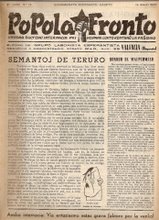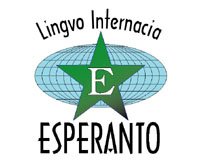La brita registaro puŝas antaŭen siajn planojn por reformo de akvo kiun kaŭzos amasan senlaborecon, degenerigon de servadoj, kaj bazon de prezpostulo por la utileco de akvo.
Akvaj prezoj por Nord-Irlando estos inter la plej altaj en la Unuiĝinta Regno (UR), ĉar la Departemento por Regiona Disvolvo preparas sin por pag-reĝimo, kiun celas igi la ĉi tiean akvan servon ‘financie memstara’.
La sistemo verŝajne estos bazita laŭ valoro de loĝejoj sen esceptoj. Oni sugestis rabaton po 25% por senlaboruloj dum oni pligrandigos la pagigojn por subvencii ĉi tiun ‘helpon’. Fakte, helpo de plej malriĉajn kaj plej vundeblajn en nia socio ne estas la celo, sed konverse estas skeptika manipulado por provi sekurigi pligrandan publikan kaj politikan konsenton. Pagoj estos plej altaj en la UR – ne forgesu ke kloakaĵaj kaj akvaj pagoj en Scotlando estas proksimume £1300 jare!
Intertempe, la ĉefo de nova Akva Servado gajnas salajron de £150,000 plus krom-salajroj por certigi, ke oni puŝas antaŭen tiun programon.
La nombro da maldungotoj eble estos proksimume 900. La centrigo de servoj plue erozios servojn en ektsteraj kaj kamparaj regionoj.
Ni devas agadi nun kaj aktive amasigi kampanjon tra laboristaj komunumoj por venki la akvan imposton. La kapimposto de Thatcher kaj pli lastatempaj provoj devigi akvajn pagigojn en Sud-Irlando estis venkitaj per amasa rekt-agado kaj amasa ne pago. Nur tia kampanjo venkos la akvajn impostojn ĉi tie. Laboristuloj ne povas ŝpari monon pagi akvon dufoje (neglektu mensogojn, ke ni ne pagas por nia akvo – ni jam pagas per lokaj impostoj!). Ni ne povas subvencii privatigon.
Ni ne eblas pagi. Ni ne volas pagi! Tiel la klara mesaĝo de la akva kampajno devas esti.
The British government are pushing ahead with plans for water reform which will see massive job losses, the running down of services and the introduction of charges for water use.Water charges for Northern Ireland are set to be amongst the highest in the UK as the Department for Regional Development lay the ground work for a charging regime aimed at making the water service here ‘self financing’. The charging regime is likely to be based on property value and there will be no exemptions. A 25% discount has been suggested for people claiming certain benefits, while the charge will be increased acrossthe board to subsidise this ‘assistance’. In fact assisting the poorest and most vulnerable in our society is not at all what this is about, rather, it is a cynical manipulation in an attempt to secure greater public and political acceptance. Charges are set to be the highest in the UK – bearing in mind that sewerage and water charges in Scotland are around £1,300 per year!Meanwhile the new Water Services boss is on a salary of £150,000 plus bonuses to ensure they push this through.
The number of jobs lost could be up to 900. The centralisation of services will further erode services in outlying and rural districts.We must seize the moment and actively build a campaign across working class communities to defeat the water tax. Thatcher’s Poll Tax and more recently attempts toimpose water charges in the south were both defeated by mass direct action and non-payment, only such a campaign will defeat the water tax here. Working class people can’t afford to pay for their water twice (ignore the lies that we don‘t pay for our water, wedo, in our rates). We can’t afford to subsidise privatisation.We can’t pay and we won’t pay! This must be the clear message of the campaign against water charges.
Monday, 28 May 2007
Sunday, 20 May 2007
What is SAT?
Sennacieca Asocio Tutmonda (the World Non-national Association) is a globally based organisation for progressive people.
SAT’s Aims
It’s aim is to help people from many different countries to understand each other, get informed and educated, improve their lives, and to communicate and cooperate with each other in the fight against oppression.
To enable such communication and cooperation, SAT uses the international language ESPERANTO.
SAT puts its members in direct contact with other progressive people from all around the world, it encourages the swapping of information, the comparison of ideas and enables the creation of a real functioning international solidarity.
SAT Activities
SAT holds its congress in a different part of the world each year.
It publishes the monthly magazine Sennaciulo and the annual literary magazine Sennacieca Revuo.
SAT also publishes books, pamphlets, brochures, leaflets, dictionaries.
Structure
SAT’s democratic and accountable structure, rather than being based on different member sections representing people within their specific national boundaries, is instead based on its individual members and their participation in the organisation - irrespective of which country they happen to live in. In this way it is a truly non-national organisation and structure.
Linked Local Associations
There exist a number of LEAs (Worker Esperanto Associations) linked to SAT. SATEB is the English speaking LEA which seeks to publicise Esperanto and recruit progressive Esperanto speakers to SAT.
SAT’s Many Tendencies
SAT is not party political, but reflects many diverse progressive tendencies. These tendencies are represented within SAT by a number of groupings or "fractions."SAT is an independent organisation but it collaboraKio estas SAT ?
Kio estas SAT?
SAT (Sennacieca Asocio Tutmonda) estas la plej grava tutmonda organizaĵo de laboristaj esperantistoj. Ĝi estas asocio, kiu celas faciligi la translingvajn kaj transnaciajn rilatojn inter tiuj homoj, kiuj luktas por mondo sen klasa nek alitipa ekspluatado.
SAT grupigas homojn ĝenerale kun maldekstraj opinioj, el ĉiuj ideologiaj tendencoj, kiuj trovas en komuna agado sian unuon. Krome, SAT estas, laŭ sia nomo, sennacieca, tio estas, tute ne gravas la nacio nek ŝtato al kiu ĝiaj anoj apartenas, kaj la asocio ne havas naciajn filiojn. Ĝi tamen kunlaboras je nacia nivelo kun la t.n. Laboristaj Esperanto-Asocioj (LEAoj), kiuj informas pri Esperanto kaj zorgas pri ĝia instruado sur diversaj lingvoteritorioj.
Unuvorte, SAT celas per konstanta uzado de Esperanto kaj ĝia mondskala aplikado, helpadi al la kreado de racie pensantaj spiritoj, kapablaj bone kompari, ĝuste kompreni kaj prijuĝi ideojn, tezojn, tendencojn kaj sekve kapablaj elekti memstare la vojon, kiun ili opinias plej rekta, aŭ plej irebla por la liberigo de sia klaso kaj forkonduko de la homaro al kiel eble plej alta ŝtupo de civilizo kaj kulturo.
SAT estas TUTMONDA asocio kun SENNACIECA strukturo. Tio signifas, ke homoj rekte aliĝas individue, kaj ne tra alia (nacia) organizo, kiel ekzemple landa asocio. En SAT tute ne estas priatentata la nacieco de la membroj.
Konkrete, SAT plenumas siajn celojn per : faciligo de rektaj ideinterŝanĝoj inter membroj pere de gazetoj, debatoj dum la jarkongreso, retaj dissendolistoj ktp... disponigo de kleriga materialo sub la formo de gazetaj artikoloj, libroj kaj broŝuroj, kaj ampleksa TTT-ejo
1. Eble por neniu en la mondo nia demokrata lingvo havas tian gravecon, kiel por la laboristoj, kaj mi esperas, ke pli aŭ malpli frue la laboristaro estos la plej forta apogo de nia afero. La laboristoj ne sole spertos la utilon de Esperanto, sed ili ankaŭ pli ol aliaj sentos la esencon kaj ideon de la esperantismo. L.-L. Zamenhof, iniciatinto de Esperanto
2. La spirita kontaktiĝo inter la diverslandaj proletoj fakte okazas nur pere de poliglotaj intelektuloj. Tial la agado de SAT, celanta kunigi, intimigi senpere la laborulojn tutmondajn, estas esence revolucia. Eŭgeno Lanti, fondinto de S.A.T.
3. SAT-anoj kutimiĝu al eksternacia sent-, pens-, kaj agadkapablo (devizo de SAT)tes with other progressive organisations that use Esperanto, and works with other Esperanto organisations. Because of its worldwide nature, the only language used in SAT is Esperanto. So in order to join, you’ll need to be relatively proficient in the language.
SAT’s Aims
It’s aim is to help people from many different countries to understand each other, get informed and educated, improve their lives, and to communicate and cooperate with each other in the fight against oppression.
To enable such communication and cooperation, SAT uses the international language ESPERANTO.
SAT puts its members in direct contact with other progressive people from all around the world, it encourages the swapping of information, the comparison of ideas and enables the creation of a real functioning international solidarity.
SAT Activities
SAT holds its congress in a different part of the world each year.
It publishes the monthly magazine Sennaciulo and the annual literary magazine Sennacieca Revuo.
SAT also publishes books, pamphlets, brochures, leaflets, dictionaries.
Structure
SAT’s democratic and accountable structure, rather than being based on different member sections representing people within their specific national boundaries, is instead based on its individual members and their participation in the organisation - irrespective of which country they happen to live in. In this way it is a truly non-national organisation and structure.
Linked Local Associations
There exist a number of LEAs (Worker Esperanto Associations) linked to SAT. SATEB is the English speaking LEA which seeks to publicise Esperanto and recruit progressive Esperanto speakers to SAT.
SAT’s Many Tendencies
SAT is not party political, but reflects many diverse progressive tendencies. These tendencies are represented within SAT by a number of groupings or "fractions."SAT is an independent organisation but it collaboraKio estas SAT ?
Kio estas SAT?
SAT (Sennacieca Asocio Tutmonda) estas la plej grava tutmonda organizaĵo de laboristaj esperantistoj. Ĝi estas asocio, kiu celas faciligi la translingvajn kaj transnaciajn rilatojn inter tiuj homoj, kiuj luktas por mondo sen klasa nek alitipa ekspluatado.
SAT grupigas homojn ĝenerale kun maldekstraj opinioj, el ĉiuj ideologiaj tendencoj, kiuj trovas en komuna agado sian unuon. Krome, SAT estas, laŭ sia nomo, sennacieca, tio estas, tute ne gravas la nacio nek ŝtato al kiu ĝiaj anoj apartenas, kaj la asocio ne havas naciajn filiojn. Ĝi tamen kunlaboras je nacia nivelo kun la t.n. Laboristaj Esperanto-Asocioj (LEAoj), kiuj informas pri Esperanto kaj zorgas pri ĝia instruado sur diversaj lingvoteritorioj.
Unuvorte, SAT celas per konstanta uzado de Esperanto kaj ĝia mondskala aplikado, helpadi al la kreado de racie pensantaj spiritoj, kapablaj bone kompari, ĝuste kompreni kaj prijuĝi ideojn, tezojn, tendencojn kaj sekve kapablaj elekti memstare la vojon, kiun ili opinias plej rekta, aŭ plej irebla por la liberigo de sia klaso kaj forkonduko de la homaro al kiel eble plej alta ŝtupo de civilizo kaj kulturo.
SAT estas TUTMONDA asocio kun SENNACIECA strukturo. Tio signifas, ke homoj rekte aliĝas individue, kaj ne tra alia (nacia) organizo, kiel ekzemple landa asocio. En SAT tute ne estas priatentata la nacieco de la membroj.
Konkrete, SAT plenumas siajn celojn per : faciligo de rektaj ideinterŝanĝoj inter membroj pere de gazetoj, debatoj dum la jarkongreso, retaj dissendolistoj ktp... disponigo de kleriga materialo sub la formo de gazetaj artikoloj, libroj kaj broŝuroj, kaj ampleksa TTT-ejo
1. Eble por neniu en la mondo nia demokrata lingvo havas tian gravecon, kiel por la laboristoj, kaj mi esperas, ke pli aŭ malpli frue la laboristaro estos la plej forta apogo de nia afero. La laboristoj ne sole spertos la utilon de Esperanto, sed ili ankaŭ pli ol aliaj sentos la esencon kaj ideon de la esperantismo. L.-L. Zamenhof, iniciatinto de Esperanto
2. La spirita kontaktiĝo inter la diverslandaj proletoj fakte okazas nur pere de poliglotaj intelektuloj. Tial la agado de SAT, celanta kunigi, intimigi senpere la laborulojn tutmondajn, estas esence revolucia. Eŭgeno Lanti, fondinto de S.A.T.
3. SAT-anoj kutimiĝu al eksternacia sent-, pens-, kaj agadkapablo (devizo de SAT)tes with other progressive organisations that use Esperanto, and works with other Esperanto organisations. Because of its worldwide nature, the only language used in SAT is Esperanto. So in order to join, you’ll need to be relatively proficient in the language.
Kio estas la Laborista Esperanto-Asocio
La Laborista Esperanto-Asocio (en Irlando) celas disvastigi Esperanton inter laboristaj kaj diversaj progresemaj movadoj en Irlando kaj aliaj anglaparolantaj landoj.
Ni klopodas kuraĝigi uzadon de Esperanto kiel internacia komunikilo inter ĉiuj progresemaj, maldekstraj kaj liberpensemaj homoj, ekz. socialistoj, komunistoj, anarkiistoj, sindikatistoj, feministoj, ekologiistoj, humanistoj, pacistoj, ktp. Alia grava rolo estas varbado de progresemaj Esperantistoj al Sennacieca Asocio Tutmonda (SAT).
Ni klopodas kuraĝigi uzadon de Esperanto kiel internacia komunikilo inter ĉiuj progresemaj, maldekstraj kaj liberpensemaj homoj, ekz. socialistoj, komunistoj, anarkiistoj, sindikatistoj, feministoj, ekologiistoj, humanistoj, pacistoj, ktp. Alia grava rolo estas varbado de progresemaj Esperantistoj al Sennacieca Asocio Tutmonda (SAT).
Workers' Esperanto Movement... What's that?
Esperanto, the international language of freedom and internationalism is alive and kicking! It's currently spoken in more than 80 countries around the world. Esperanto is a relatively simple neutral language, and is far easier to learn than any national language.There exists a worldwide movement which uses Esperanto everyday as a means of communication, peace and friendship between ordinary people from many different countries. Since its creation, Esperanto has been used with positive results by progressive, left-wing and freethinking people. It has enabled, and continues to enable, many ordinary people, socialists, trade unionists, communists, anarchists, greens, humanists, members of the peace movement, feminists, anti-globalists, etc, to make direct links with their counterparts overseas (without having to rely on intermediaries, expensive professional translators, or the bias of the various national mass medias). Reflecting this movement, there exist "LEAs" (Worker Esperanto Associations) in various countries, which all help to promote Esperanto within their respective progressive and working class movements.
To find out more about the Workers Esperanto Association in Ireland, contact us at: esperantoireland@yahoo.com
To find out more about the Workers Esperanto Association in Ireland, contact us at: esperantoireland@yahoo.com
Subscribe to:
Comments (Atom)










